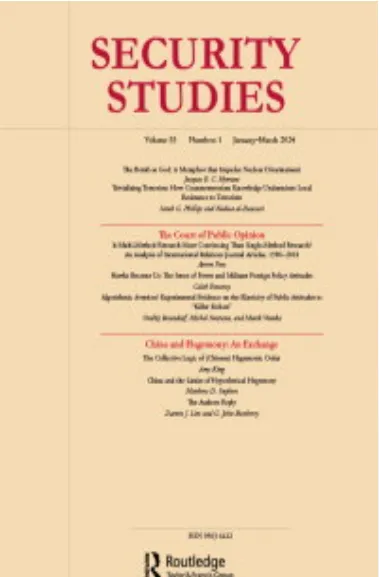期刊簡介

【安全研究】( Security Studies )收錄出版創新性的學術稿件——無論是理論研究、實踐經驗分享還是兩者兼而有之。安全研究包含廣泛的議題,從核擴散、核威懾、軍民關系、戰略文化、種族沖突、流行病與國家安全、民主政治、外交決策到定性與多方法研究的發展。2022年該刊的影響因子為1.800。
本期目錄(節選)
1
原子彈即神:阻礙核裁軍的隱喻
The Bomb as God: A Metaphor that Impedes Nuclear Disarmament
2
輕視恐怖分子:反恐知識如何削弱當地對恐怖主義的抵抗力
Trivializing Terrorists: How Counterterrorism Knowledge Undermines Local Resistance to Terrorism
3
多方法研究比單一方法研究更有說服力嗎?1980-2018年國際關系期刊文章分析
Is Multi-Method Research More Convincing Than Single-Method Research? An Analysis of International Relations Journal Articles, 1980–2018
4
鷹派成為我們:權力感和激進的外交政策態度
Hawks Become Us: The Sense of Power and Militant Foreign Policy Attitudes
5
演算法厭惡?關於「殺手機器人」公眾態度彈性的實驗證據
Algorithmic Aversion? Experimental Evidence on the Elasticity of Public Attitudes to 「Killer Robots」
內容摘要
原子彈即神:阻礙核裁軍的隱喻
題目: The Bomb as God: A Metaphor that Impedes Nuclear Disarmament
作者: Jacques E. C. Hymans,南加州大學國際關系副教授。
摘要: 「核嵌入性」指的是一個國家無法對其核武庫進行重新的考慮和計量。在一國的政治文化中,原子彈即上帝的隱喻不斷深化從而鞏固了這種「核嵌入性」。因為將某物比喻為神會超出,甚至理性的計算,所以將原子彈比喻為神有力地阻止了一個國家對核裁軍道路的考慮。本文透過對美國、印度、巴基斯坦和北韓核政策的歷史分析,以及對最終反對原子彈的三位美國、英國和法國高級核官員的案例研究,探討了這一假設的合理性。
「Nuclear embeddedness」 refers to a state’s persistent failure to reconsider its possession of a nuclear arsenal. The sedimentation of the metaphor of the Bomb as God in a state’s political culture consolidates 「nuclear embeddedness.」 Because metaphorizing something as God puts it beyond even boundedly rational calculation, the metaphor of the Bomb as God effectively blocks a state from seeing its way clear to nuclear renunciation. The article probes the plausibility of this hypothesis with historical analyses of the nuclear policies of the U.S., India, Pakistan, and North Korea, and with case studies of three high-level American, British, and French nuclear officials who ultimately turned against the Bomb.
輕視恐怖分子:反恐知識如何削弱當地對恐怖主義的抵抗力
題目: Trivializing Terrorists: How Counterterrorism Knowledge Undermines Local Resistance to Terrorism
作者: Sarah G. Phillips,悉尼大學政府與國際關系學科全球沖突與發展研究教授;Nadwa al-Dawsari,中東研究所的客座學者。
摘要: 本文探討了反恐知識實踐如何影響他們所研究的群體。我們認為,這些做法通常將恐怖組織構建為本體論上穩定且組織上合理的組織,這使得反恐組織認為他們了解恐怖組織因此可以被管制。本文表明,透過排除普遍的當地知識,西方反恐政策話語將構建「恐怖分子」類別的權力分配給那些沒有相關「恐怖分子」日常生活經驗的人。這削弱了了解是什麽維持著這些團體存在,可能消滅它們的方法,更重要的是,是什麽使得他們似乎不太可能構成嚴重威脅,甚至荒謬的是,造就了那些據稱需要他們支持才能作為恐怖分子生存的人。利用也門的證據,本文表明,被貼上「恐怖分子」標簽的團體不屬於反恐組織需要采取行動的類別。我們認為,雖然強加分類有助於反恐組織找到其假設的行動目標,但它也為暴力行為者提供了產生和演變的途徑。
This article explores how counterterrorism knowledge practices affect the groups they study. We argue that these practices typically construct terrorist groups as ontologically stable and organizationally rational, which makes them appear familiar to, and so governable by, counterterrorism organizations. We show that by excluding prevalent local knowledge, Western counterterrorism policy discourses assign the power to construct the category of 「terrorist」 to those without daily lived experience of the 「terrorists」 in question. This undermines different ways of knowing what sustains these groups, what might eradicate them and, more importantly, what might make their ability to pose a serious threat seem unlikely, or even absurd, to those whose support they purportedly need to survive as terrorists. Using evidence from Yemen, we show that groups labelled as 「terrorists」 do not fit into the stable categories that counterterrorism organizations require to produce actionable targets. We argue that while imposing such categories helps counterterrorists find targets that reflect their assumptions, it also generates pathways for violent actors to evolve and reproduce.
多方法研究比單一方法研究更有說服力嗎?1980-2018年國際關系期刊文章分析
題目: Is Multi-Method Research More Convincing Than Single-Method Research? An Analysis of International Relations Journal Articles, 1980–2018
作者: Anton Peez,法蘭克福大學的博士後,法蘭克福和平研究所副研究員。
摘要: 雖然一些社會科學家認為多方法研究(MMR)是一種很有前途的強因果推理策略,但其他人則認為它對加強研究的有效性幾乎沒有幫助。本文系統地回顧了MMR在主流國際關系中的套用,特別是在安全研究領域。使用 TRIP 期刊文章數據庫和 Web of Science 引文數據,我檢查了 MMR 是否已發揮其全部潛力。自 2000 年代以來,MMR 越來越突出。學者們最常用它來研究國內問題而不是國家間問題。他們參照MMR文章的次數少於參照純定量方法文章的次數,並且與參照純定性方法研究的次數大致相同。這表明MMR並沒有更具影響力,也沒有被認為更具說服力。然而,近年來這種差距有所縮小。本研究為國際關系的研究設計和學科層面、MMR的實用性以及社會科學中的知識積累提供了見解。
While some social scientists see multi-method research (MMR) as a promising strategy for strong causal inference, others argue that it does little to strengthen the validity of research. This paper offers a systematic review of how MMR has been used in mainstream International Relations (IR) and specifically in security studies. Using the TRIP Journal Article Database and Web of Science citation data, I examine whether MMR has reached its full potential. MMR has grown in prominence since the 2000s. Scholars use it most often to examine domestic rather than interstate issues. They cite MMR articles less than they cite quantitative single-method articles and about as often as they cite qualitative single-method research. This suggests that MMR is not more influential, nor perceived as more persuasive. However, this gap has decreased in recent years. The study provides insights into IR at the research design and disciplinary levels, the utility of MMR, and knowledge accumulation in social science.
鷹派成為我們:權力感和激進的外交政策態度
題目: Hawks Become Us: The Sense of Power and Militant Foreign Policy Attitudes
作者: Caleb Pomeroy,達特茅斯學院約翰·史隆·迪基國際理解中心的戴安娜·戴維斯·斯賓塞美國外交政策和國際安全博士後研究員。
摘要: 權力如何塑造外交政策態度?借鑒關於權力的前沿心理學研究,本文認為相對國家權力感可以解釋外交政策中的鷹派。「我們的國家」比「你的國家」更強大的直覺啟用了激進的國際主義,這種取向以武力和威懾力為實作國家目標的效力為取向。除了對世界的總體取向外,這種權力感還解釋了對緊迫安全問題的不同態度,從南海的威脅感知到對伊朗使用核武器。在美國、中國和俄羅斯中進行的五項原始調查,以及一項針對美國公眾的實驗,都支持了這些說法。國家權力的心理影響掩蓋了行為IR中常見的性格特征,如個人的性格和道德傾向。更令人驚訝的是,權力會改變個人,即使是最鴿派的人也會成為鷹派。總而言之,本文提出了「第一意象反轉」,挑戰了標準的自下而上的外交政策觀點,並在潛在的美國衰落、中國崛起和俄羅斯好戰的時代提供了獨特的解釋杠桿。
How does power shape foreign policy attitudes? Drawing on advances in psychological research on power, I argue that the sense of relative state power explains foreign policy hawkishness. The intuitive sense that 「our state」 is stronger than 「your state」 activates militant internationalism, an orientation centered on the efficacy of force and deterrence to achieve state aims. Beyond general orientation towards the world, this sense of power explains discrete attitudes towards pressing security issues, from threat perception in the South China Sea to nuclear weapons use against Iran. Five original surveys across the US, China, and Russia, as well as an experiment fielded on the US public, lend support to these claims. The psychological effects of state power overshadow dispositional traits common in behavioral IR, like individuals’ personalities and moral proclivities. More surprisingly, power changes individuals, making hawks of even the most dovish. Taken together, the paper presents a 「first image reversed」 challenge to standard bottom-up accounts of foreign policy opinion and offers unique explanatory leverage in a potential era of US decline, China’s rise, and Russian belligerence.
演算法厭惡?關於「殺手機器人」公眾態度彈性的實驗證據
題目: Algorithmic Aversion? Experimental Evidence on the Elasticity of Public Attitudes to 「Killer Robots」
作者: Ondřej Rosendorf,卓思大學社會科學學院的博士候選人,漢堡大學和平研究與安全政策研究所研究員;Michal Smetana,卓思大學社會科學學院的副教授,布拉格和平研究中心負責人;Marek Vranka,卓思大學社會科學學院助理教授,布拉格和平研究中心研究員。
摘要: 致命自主武器系統是一項突出但有爭議的軍事創新。雖然先前的研究表明,部署「殺手機器人」將面臨相當大的公眾反對,但我們對這些態度的彈性,以及它們如何受到不同因素影響的理解仍然有限。在本文中,我們旨在探討公眾態度對三個特定因素的敏感性:對技術容易發生事故的擔憂,對不良後果的責任歸屬的擔憂,以及對自動殺戮內建的無尊嚴性質的擔憂。我們對大量美國人的調查實驗表明,公眾對自主武器的態度在很大程度上取決於人們對它們相對於人工作業系統的出錯率的觀念。此外,我們發現有限的證據表明,關註人類尊嚴受到侵犯的個體更有可能反對「殺手機器人」。這些發現對當前關於自主武器國際監管的政策辯論具有重要意義。
Lethal autonomous weapon systems present a prominent yet controversial military innovation. While previous studies have indicated that the deployment of 「killer robots」 would face considerable public opposition, our understanding of the elasticity of these attitudes, contingent on different factors, remains limited. In this article, we aim to explore the sensitivity of public attitudes to three specific factors: concerns about the accident-prone nature of the technology, concerns about responsibility attribution for adverse outcomes, and concerns about the inherently undignified nature of automated killing. Our survey experiment with a large sample of Americans reveals that public attitudes toward autonomous weapons are significantly contingent on beliefs about their error-proneness relative to human-operated systems. Additionally, we find limited evidence that individuals concerned about human dignity violations are more likely to oppose 「killer robots.」 These findings hold significance for current policy debates about the international regulation of autonomous weapons.
編譯 | 朱嘉成
審校 | 陳正興
排版 | 李明仰
本文源於【安全研究】2024年第1期 ,本文為公益分享,服務於科研教學,不代表本平台觀點。如有疏漏,歡迎指正。











